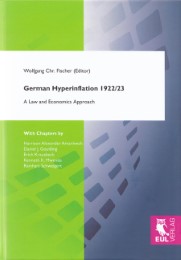-
Zusatztext
-
The traditional positioning of the German Hyperinflation within the history of the so-called Weimar Republic (Deutsches Reich) is to declare this devastating event as one of the stepping stones to establish Hitler¿s Nazi Regime. However, there is little in law and economics literature to explain the colossal acceleration of the creeping inflation in the very short time from July to November 1923 to a massive hyperinflation.This research rejects the standard argument that the sole cause of the German Hyperinflation was neither the lack of sufficient taxation, the high amount of war bonds issued during WWI, the reparation payments which had to be made after the war by the new German Government, nor the social unrest in addition to the political instability at that time. The termination of the German Hyperinflation was accomplished by legal measures through German Supreme Court judgements as well as through the Parliamentarian calculation of the conversion rate Mark to Reichsmark on the basis of valorism and not nominalism, which was not completely fair enough to everyone but an optimal solution under current socio-economic conditions. In addition monetary measures such as those which were instigated by the German Reserve Bank through the implementation of the Rentenmark, a new currency backed by state land properties to re-establish trust, may be an example of how to deal with future hyperinflations in developed and developing countries.Nevertheless the immense acceleration process in hyperinflations still remains unclear and unpredictable. The transformation of an inflationary development into the hyperinflation as a very complex phenomenon, which was undertaken to some extent in this research, could be a further advanced research avenue of the complexity economics in conjunction with research areas like mass hysteria, bandwagon effect, social brain and mirror neurons.
-
-
Kurztext
-
The traditional positioning of the German Hyperinflation within the history of the so-called Weimar Republic (Deutsches Reich) is to declare this devastating event as one of the stepping stones to establish Hitler's Nazi Regime. However, there is little in law and economics literature to explain the colossal acceleration of the creeping inflation in the very short time from July to November 1923 to a massive hyperinflation. This research rejects the standard argument that the sole cause of the German Hyperinflation was neither the lack of sufficient taxation, the high amount of war bonds issued during WWI, the reparation payments which had to be made after the war by the new German Government, nor the social unrest in addition to the political instability at that time. The termination of the German Hyperinflation was accomplished by legal measures through German Supreme Court judgements as well as through the Parliamentarian calculation of the conversion rate Mark to Reichsmark on the basis of valorism and not nominalism, which was not completely fair enough to everyone but an optimal solution under current socio-economic conditions. In addition monetary measures such as those which were instigated by the German Reserve Bank through the implementation of the Rentenmark, a new currency backed by state land properties to re-establish trust, may be an example of how to deal with future hyperinflations in developed and developing countries. Nevertheless the immense acceleration process in hyperinflations still remains unclear and unpredictable. The transformation of an inflationary development into the hyperinflation as a very complex phenomenon, which was undertaken to some extent in this research, could be a further advanced research avenue of the complexity economics in conjunction with research areas like mass hysteria, bandwagon effect, social brain and mirror neurons.
-
-
Autorenportrait
- Wolfgang Chr. Fischer, born 1942, studied Economics, History and Law at Universität des Saarlandes and at Rheinische FriedrichWilhelms-Universität Bonn. He was awarded Dr. rer. pol. in 1971 from the Faculty of Law & Economics, Rheinische Friedrich-Wilhelms-Universität Bonn, where he had been Academic Assistant at the Institute of Economic Policy. From 1975 until his retirement he was Professor of Economics at University of Bremen. Currently he is Adjunct Professor of Economics in the School of Law, James Cook University, Australia.
Detailansicht
German Hyperinflation 1922/23
A Law and Economics Approach
ISBN/EAN: 9783899369311
Umbreit-Nr.: 1126009
Sprache:
Englisch
Umfang: XVI, 204 S., zahlr. schw.-w. Abb. u. Tab.
Format in cm: 2 x 25 x 17.6
Einband:
gebundenes Buch
Erschienen am 25.06.2010
Auflage: 1/2010


